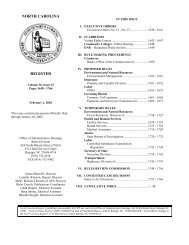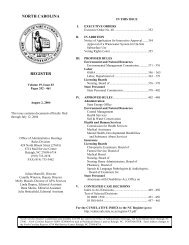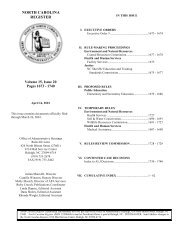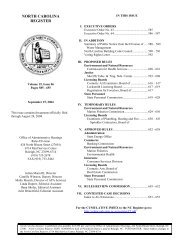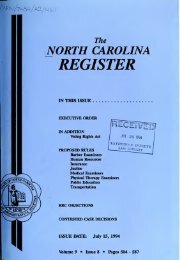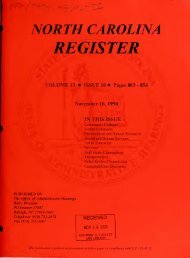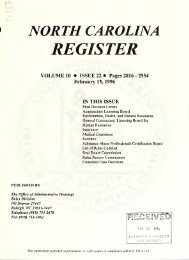NC Register Volume 21 Issue 09 - Office of Administrative Hearings
NC Register Volume 21 Issue 09 - Office of Administrative Hearings
NC Register Volume 21 Issue 09 - Office of Administrative Hearings
Create successful ePaper yourself
Turn your PDF publications into a flip-book with our unique Google optimized e-Paper software.
PROPOSED RULES<br />
(c) The joints between walls and floors shall be rounded or be<br />
otherwise constructed to provide a tight seal between the floor<br />
and wall.<br />
(d) Floors, which are subjected to flood type cleaning, shall be<br />
provided with floor drains and shall slope to drain.<br />
(e) Clean carpet, in good repair, may be used in dining areas.<br />
Authority G.S. 130A-235; 130A-248.<br />
15A <strong>NC</strong>AC 18A .3637 FOOD SERVICE AREA WALLS<br />
AND CEILINGS<br />
(a) Walls and ceilings <strong>of</strong> all rooms in which food is stored,<br />
handled, prepared or served or in which utensils are washed or<br />
stored shall be kept clean and in good repair. Water stains on<br />
walls or ceilings do not constitute a violation <strong>of</strong> this Rule unless<br />
mold or mildew is present.<br />
(b) The walls <strong>of</strong> kitchens and other rooms used for the<br />
preparation <strong>of</strong> food and the washing <strong>of</strong> utensils shall be smooth,<br />
washable and be kept clean. Acceptable wall materials include<br />
but are not limited to: glazed tile; fiberglass reinforced panels,<br />
stainless steel, wood or metal; wall board painted with washable,<br />
non-absorbent paint; and brick, cinder blocks, slag blocks or<br />
concrete blocks, if glazed, tiled, plastered or filled to provide a<br />
smooth surface. Ceilings in kitchens and other rooms used for<br />
the preparation <strong>of</strong> food or the washing <strong>of</strong> utensils shall be<br />
washable. Acceptable materials include, but are not limited to,<br />
perforated or non-perforated vinyl faced acoustical tile, and<br />
fiberglass reinforced panels and painted wallboard.<br />
(c) The walls and ceilings <strong>of</strong> the dining rooms and other food<br />
serving rooms shall be <strong>of</strong> sound construction.<br />
(d) The walls and ceilings <strong>of</strong> dry storage rooms shall be <strong>of</strong><br />
sound construction; however, a washable finish is not required.<br />
(e) The walls and ceilings <strong>of</strong> the wait stations that prepare<br />
beverages and bars that only prepare beverages and wash<br />
utensils with no food preparation other than garnishes for drinks<br />
shall be <strong>of</strong> sound construction, provided the interior walls <strong>of</strong><br />
these wait stations and bars shall be finished to be smooth and<br />
washable.<br />
Authority G.S. 130A-235; 130A-248.<br />
15A <strong>NC</strong>AC 18A .3638 KITCHEN PREMISES:<br />
MISCELLANEOUS<br />
(a) None <strong>of</strong> the operations shall be conducted in any room used<br />
for domestic purposes. A domestic kitchen shall not be used in<br />
connection with the operation <strong>of</strong> a camp.<br />
(b) Packout or trip kitchens where food is portioned and stored<br />
for cookouts or overnight trips, where utensils and equipment<br />
are not returned to a central kitchen for cleaning, and are not<br />
located in the same building as a camp kitchen, shall be<br />
equipped with at least a two-compartment sink with 24-inch<br />
drainboads or countertop space at each end for handling dirty<br />
items and air drying clean items. Sinks shall be <strong>of</strong> sufficient size<br />
to submerge, wash, rinse and sanitize utensils and equipment.<br />
Any area where food is portioned shall also be equipped with a<br />
separate handwash lavatory with a hot and cold mixing faucet,<br />
soap and individual towels or hand-drying device.<br />
(c) Residential style educational activity kitchens with domestic<br />
utensils and equipment may be used by groups <strong>of</strong> 32 or less<br />
campers and staff to prepare meals only for members <strong>of</strong> the<br />
group. Field sanitation measures <strong>of</strong> Rule .3619 may be used in<br />
these facilities.<br />
(d) Soiled linens, coats and aprons shall be kept in containers<br />
provided for this purpose. Laundered table linen and cleaning<br />
cloths shall be stored in a clean place until used.<br />
(e) Toxic materials, cleaners, sanitizers or similar products used<br />
in a camp shall be labeled with the common name or<br />
manufacturer's label.<br />
(f) A special area for storage <strong>of</strong> toxic materials shall be<br />
provided and plainly marked. This requirement shall not apply<br />
to cleaners and sanitizers used frequently in the operation <strong>of</strong> the<br />
camp kitchen that are stored for availability and convenience if<br />
the materials are stored to prevent the contamination <strong>of</strong> food,<br />
equipment, utensils, linens and single-service items.<br />
(g) Storage shall be provided for mops, brushes, brooms, hoses<br />
and other items in routine use.<br />
(h) The premises under control <strong>of</strong> the management shall be kept<br />
free <strong>of</strong> items that provide fly or mosquito breeding places or<br />
rodent harborages. Effective measures such as fly repellant fans,<br />
self-closing doors, screens and routine use <strong>of</strong> approved<br />
pesticides shall be taken to keep insects, rodents, animals and<br />
other public health pests out <strong>of</strong> the camp kitchen and food<br />
service area storage spaces.<br />
(i) Except as specified below, live animals shall not be allowed<br />
in a food preparation, storage or dining area. Live animals shall<br />
be allowed in the following situations if their presence will not<br />
result in the contamination <strong>of</strong> equipment, utensils, linens and<br />
unwrapped single-service and single-use items:<br />
(1) fish or crustacea in aquariums or display tanks;<br />
(2) patrol dogs accompanying police or security<br />
<strong>of</strong>ficers in <strong>of</strong>fices and dining, sales and storage<br />
areas; and<br />
(3) service animals accompanying persons with<br />
disabilities in areas that are not used for food<br />
preparation.<br />
Authority G.S. 130A-235; 130A-248.<br />
15A <strong>NC</strong>AC 18A .3639 INFORMAL REVIEW PROCESS<br />
AND APPEALS PROCEDURE<br />
(a) If a permit holder disagrees with a decision <strong>of</strong> an<br />
environmental health specialist on the interpretation, application<br />
or enforcement <strong>of</strong> the rules <strong>of</strong> this Section, the permit holder<br />
may:<br />
(1) request an informal review pursuant to<br />
Paragraphs (d) and (e) <strong>of</strong> this Rule; or<br />
(2) initiate an appeal in accordance with G.S.<br />
150B.<br />
(b) The permit holder is not required to complete the alternative<br />
dispute resolution prior to initiating an appeal in accordance with<br />
G.S. 150B.<br />
(c) If the permit holder requests an informal review, the request<br />
shall be in writing and shall be postmarked or hand delivered to<br />
the local health department within seven days <strong>of</strong> notice <strong>of</strong> the<br />
decision giving rise to the review. The request shall briefly state<br />
the issues in dispute. In the event the inspection giving rise to<br />
the informal review was conducted by the environmental health<br />
supervisor in the county or area where the resident camp is<br />
<strong>21</strong>:<strong>09</strong> NORTH CAROLINA REGISTER NOVEMBER 1, 2006<br />
798




